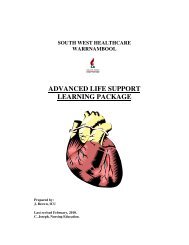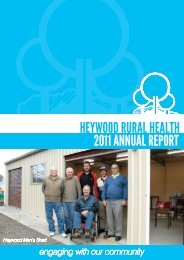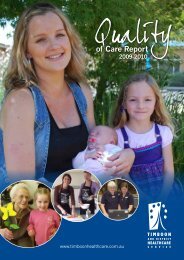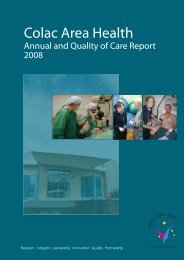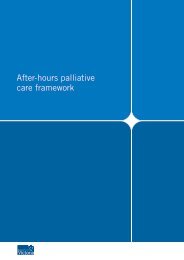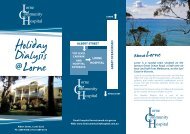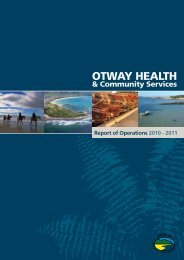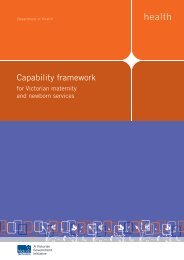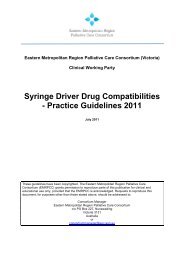Self Directed Learning Package - University of Queensland
Self Directed Learning Package - University of Queensland
Self Directed Learning Package - University of Queensland
- No tags were found...
Create successful ePaper yourself
Turn your PDF publications into a flip-book with our unique Google optimized e-Paper software.
160 • The Palliative Approach Toolkit6. You are asked to help Bob shower this morning. You should rush him and get it over as quick as possiblethen he can take the rest <strong>of</strong> the day to recover.• Residents with dyspnoea benefit from having a preventative plan <strong>of</strong> care that decreases the distress andanxiety <strong>of</strong> dyspnoea before it occurs.• Bob might take a small dose <strong>of</strong> opioid medication (e.g. morphine) at least ½ hour before showering (morphinecan be effective for breathless as well as pain).• Don’t rush or hurry Bob and allow rest periods during activities (decreases his need for oxygen andreduces anxiety).• In the bathroom, leave the exhaust fan on and make sure the shower water is deflected away from his face(prevents claustrophobia).TrueFalseSection 27. Family members have the right to determine if a resident should attend a palliative care case conferenceon the grounds that ‘it will only upset him/her’.• As careworkers our primary role is to provide resident centred care which includes advocating on the resident’s behalf.• Perhaps the resident would be upset about what is discussed, but it is up to them (while they are cognitivelyable to make decisions competently) to decide whether they will attend.• Most residents choose to attend case conferences and can provide insights into their condition that family andstaff may not have known about otherwise.• If a resident is likely to become distressed or fatigued, consider holding the case conference in their room wherethey can rest on the bed. Ask their permission to continue the discussion elsewhere with theremainder <strong>of</strong> those attending.8. Regardless <strong>of</strong> the language a resident speaks or where they were born their care needs are the same whenthey are dying.• All residents require careful assessment to ensure that assumptions are not made about cultural needs basedon a resident’s language, religion or country <strong>of</strong> origin. Similarly, the care needs for members <strong>of</strong> our indigenouspopulation (Aboriginal and Torres Strait Islanders) requires careful assessment and planning.9. If a competent resident tells you they have pain, is it good practice to ask how severe it is on a scale <strong>of</strong> 0 to 10.• The use <strong>of</strong> horizontal or vertical pain scale which asks the person to rate 0 (no pain) or 10(worst pain possible) is good practice to assess pain for compentent residents who do not have severe cognitiveimpairment e.g. advanced dementia.10. Facial expressions and vocalisations can indicate if a resident is experiencing pain.• The Abbey Pain Scale lists whimpering, groaning, and crying as possible indicators <strong>of</strong> pain.



